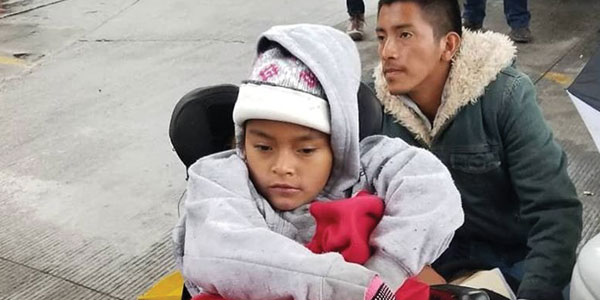
By Jorge Ramos
Lesly, 7, is a wheelchair. She can’t speak, can’t walk, can’t eat on her own. She began having seizures when she was 7 months old. Doctors believe she had a stroke at some point, and her condition has never improved. But Juan Alberto Matheu, her father, isn’t about to give up on her. Months ago he embarked on a journey north with his daughter, traveling thousands of miles, from Honduras to Tijuana.
It wasn’t that Juan Alberto, 27, wanted to leave Honduras; violence and poverty had made it impossible to stay. “I had to leave my country for my daughter’s sake,” he told me in a recent interview. “In Honduras, a girl like her, in need of special care, suffers a lot of discrimination.”
When Juan Alberto learned that a caravan of migrants was traveling from his country to the U.S. border, he and his daughter joined up. He didn’t have a choice. “I had a job, but I was paid very little,” he said. He never could have saved enough money to pay the thousands of dollars a smuggler would demand to bring them to the United States, he said. Besides, no smuggler would’ve agreed to try and get a disabled girl across the border.
The journey has been very difficult. Juan Alberto said that over the last two months he has always either pushed Lesly in her chair or found a place for her and her wheelchair riding in freight trucks. “I was afraid of losing her in the trailers,” he told me, “or that she would fall.” But Juan Alberto didn’t lose her. He never left Lesly’s side, not for a single moment.
Juan Alberto’s compassion and devotion as a single father has moved many along their journey. He feeds Lesly from a bottle, because she cannot swallow solid food, and cleans her with dry towels, because the two of them together can’t fit into the makeshift bathrooms of the migrant shelters.
I asked Juan Alberto about Lesly’s mother. “We separated three years ago,” he said. “She left her with me. … She says it’s a huge responsibility. So, since I am her father, I lovingly fight for her every single day.”
His plan was to apply for a humanitarian visa or seek political asylum in the United States, but he had to be on American soil in order to do so, which was almost impossible. President Donald Trump has all but sealed the Mexican border in Tijuana, and border agents process only about a dozen applications per day. When Juan Alberto and his daughter arrived, hundreds of people were already waiting in line.
But then something unbelievable happened.
Activists and lawyers persuaded American immigration agents to expedite Lesly’s case. So Lesly and her father, still pushing her wheelchair, made it through the last few meters of their journey and crossed over the border.
“It’s a love story you never get to see in the movies,” said Mark Lane, who runs the Minority Humanitarian Foundation, a San Diego-based nonprofit group that assisted Juan Alberto and his daughter. A family in San Diego has given them a place to live, and a law firm in Los Angeles is representing Juan Alberto and Lesly, pro bono.
Meanwhile, Trump is demanding $5 billion from Congress to build a wall, and threatening to shut down the government if he doesn’t get what he wants. This is after making up a so-called invasion at the border and declaring a national emergency. What Trump fails to understand is that walls can’t stop people like Juan Alberto and Lesly. I would proudly welcome to my country a father who fought like this for his daughter.
This is indeed a great love story unfolding along the border. But it’s also a great example of how ordinary people can change lives. Many Mexicans offered Juan Alberto and Lesly a helping hand along the way, and a financial and legal assistance network quickly formed in the United States to help them when they arrived.
Juan Alberto must wear an ankle monitor that won’t be removed until he appears in court, but he and Lesly have reached their destination and are doing well. “My girl is beautiful,” he told me. “She is like a little angel, so full of love.”
P.S. You can watch my interview with Lesly and Juan Alberto here: bit.ly/2En9Low.
____________________________________________________________________________________________
Historia de Amor en la Frontera
Lesly está en una silla de ruedas. No habla. No camina. No puede comer sola. Desde que cumplió los 7 meses de edad empezó a convulsionar. Los médicos que la han tratado creen que sufrió un derrame cerebral. Lesly ya cumplió los 7 años y no ha mejorado. Pero su padre, Juan Alberto Matheu, no se ha dado por vencido. La ha empujado y cargado miles de kilómetros desde Honduras hasta Tijuana.
“Todo el camino ha sido muy difícil”, me dijo el padre de 27 años de edad en una entrevista. Cuando no la empujaba, subía a Lesly — con todo y su silla de ruedas — a camiones de carga en un trayecto que duró casi dos meses. “Mi temor era perderla a ella en remolques y que se me fuera a caer”. Pero no la perdió porque Juan Alberto no ha dejado a Lesly sola ni un segundo.
“Yo tuve que salir de mi país por la salud de mi niña”, me contó. “En Honduras hay mucha discriminación para una niña así que necesita cuidados especiales. Yo tengo trabajo, pero me pagan muy poco”.
Cuando Juan Alberto se enteró que una caravana de inmigrantes estaba saliendo desde su país hasta Estados Unidos, inmediatamente se unió junto con su hija. Era su única opción. Nunca hubiera podido ahorrar suficiente para pagarle miles de dólares a un coyote. Y nadie hubiera querido llevar a una niña con discapacidad.
Lo más curioso de todo es que Juan Alberto no quería irse de Honduras. “Nosotros salimos de nuestro país no porque queremos, sino por la pobreza y la violencia en que vivimos”, me contó.
Juan Alberto es un padre soltero. Y la devoción por su hija ha conmovido a muchos a lo largo del trayecto. La limpia con toallas secas, ya que los dos juntos no pueden entrar a los improvisados sanitarios de los albergues, le da biberón, por que la comida sólida se le atora en la garganta, y siempre le pone un pañal.
¿Qué pasó con su mamá? le pregunté. “Hace tres años nos separamos”, me dijo. “Ella me la mandó a mí. Ya con el tiempo no se la quiso volver a llevar. Dice que es mucha responsabilidad. Entonces, como yo soy el padre de ella, cada día lucho con amor”.
Su plan era pedir una visa humanitaria en Estados Unidos o solicitar asilo político. Pero antes tenía que presentar la solicitud en territorio estadounidense, algo casi imposible. El presidente Donald Trump ha sellado la frontera con Tijuana, y sus agentes apenas procesan unas decenas de solicitudes por día. Cientos esperaban antes que Juan Alberto y su hija.
Y entonces ocurrió lo increíble.
Activistas y abogados presionaron a los agentes migratorios de Estados Unidos en la frontera para que le dieron un tratamiento especial al caso de Lesly. Así ella y su padre, quien la empujaba en su carriola, pudieron cruzar los pocos metros que les faltaban para entrar a Estados Unidos.
“Es una historia de amor que ni en las películas van a ver”, dijo Mark Lane por televisión. El dirige la organización no lucrativa que apoyó a Juan Alberto y a su hija desde un principio. Pero no es el único. Una familia de San Diego les ha dado un lugar dónde vivir y una firma de abogados de Los Ángeles ha tomado su caso sin cobrar.
Todo esto ocurre mientras Trump le está pidiendo $5 mil millones de dólares al congreso para construir más muros. Dice que si no se lo dan, va a cerrar el gobierno. Trump se ha inventado una “invasión” y una emergencia nacional en la frontera. Además, no entiende que los muros nunca han podido detener productos, ideas, emociones y gente, como Juan Alberto y Lesly. Yo quisiera en mi país a un padre que pelea así por su hija.
Sí, esta es una historia de amor en la frontera. Pero también es un gran ejemplo de cómo la gente, sin puestos políticos, puede cambiar vidas. Muchos mexicanos anónimos ayudaron a Juan Alberto y a Lesly en el camino. “Aquí hay muchas personas buenas”, me dijo. Y en Estados Unidos se ha armado rápidamente una red de ayuda, económica y legal, para padre e hija.
Juan Alberto tiene un grillete en su tobillo. No se lo quitarán hasta que vaya a Corte. Pero por fin llegó a dónde quería. “Mi niña es hermosa”, me dijo antes de despedirse. “Es como un angelito, llena de amor”.
Posdata: Aquí pueden ver el video de la entrevista con Lesly y Juan Alberto: bit.ly/2En9Low.
Notas del Editor: Jorge Ramos, periodista ganador del Emmy, es el principal director de noticias de Univisión Network.










